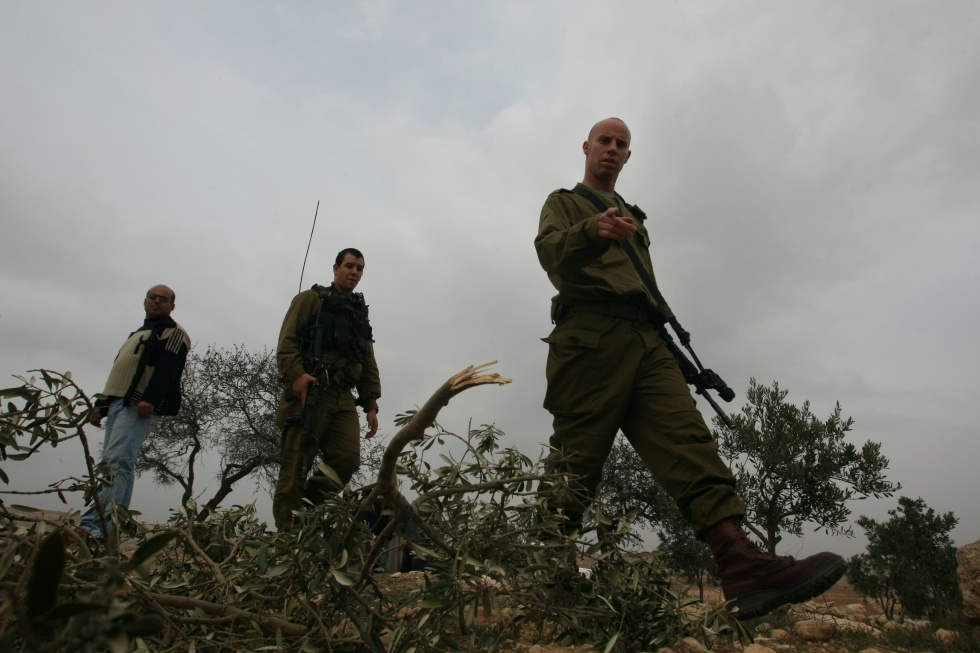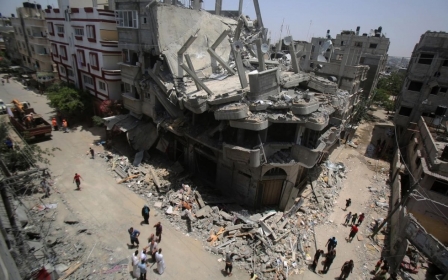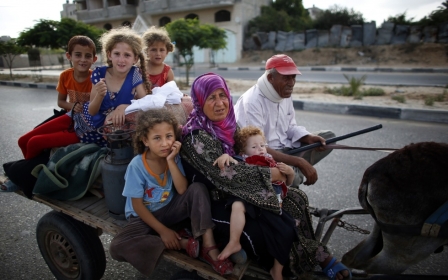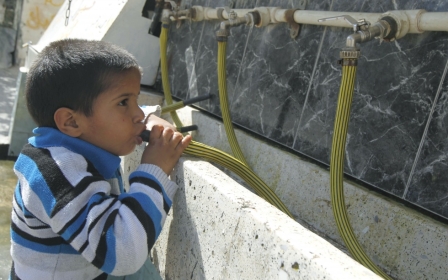Analysis: Does Israel really think it can destroy Hamas?

The City Which Doesn't Stop was originally a public relations slogan, invented some 30 years ago to revive the image of the Tel Aviv municipality. But as years went by, Tel Avivians began to believe in their own myth: Israel’s metropolis was a city of constant movement.
But on Saturday at 9pm local time (19.00 GMT) the city did stop. The missile attack Hamas warned about arrived on cue, sending hundreds of thousands to hide in staircases and other make-shift shelters.
The usually packed street cafes around the city hall were almost empty. There was no panic, as the rockets did not cause damage in human lives or even property, but the tension was present. If Hamas' aim was to make Israelis feel there is a war raging some 70 Km from Tel Aviv, they succeeded.
The headlines about "Israel under attack" were alarmist, but after more than 800 rockets were fired from Gaza at targets up north in Haifa or eastward to Jerusalem, not to mention cities like Ashdod or Sderot, the atmosphere is uncomfortable.
Yet it is questionable how much this awareness will change the course of current conflict with Hamas. On the contrary, it seems that Saturday night’s rocket attack will only strengthen voices calling for a tougher action against Hamas, to "kick their ass”.
This is as if Israeli air raids killing more than 160 Palestinians were not tough enough. The Israeli army themselves admit that only half of the fatalities are combatants, although the Palestinian Center for Human Rights (PCHR) claims that some 90 percent of the Palestinians casualties have been civilians, a ratio highter than in the ill-famed operation Cast Lead in 2008.
It is still not clear if Israel will venture into a ground operation in Gaza. Prime Minister Netanyahu seems hesitant, but may find his right-wing ministers who are beating the drums of war like Naftaly Benet and Avigdor Lieberman, hard to resist.
The army itself is unenthusiastic. The fact that a commando attack by an Israeli elite force on Sunday morning failed, and ended with three soldiers being wounded, did not whet its appetite.
In any case, a full-blown ground operation involving the re-occupation of the Gaza Strip is unlikely. So it looks like more of the same, only on a larger scale. The populated area north of Gaza City could be razed to the ground after their residents got early warnings.
But the most remarkable - and depressing - feature of this round of violence is the gap between the realisation, expressed by almost all politicians, military commanders and analysts, that this shelling and bombing will give Israel at the most only a few months of quiet and the almost total indifference to the price paid by the Palestinians in civilian lives.
"In the past, we were given hope that we will crush Hamas," says Nir Baram, one of the leading young Israeli writers. "Now they don't even promise anything. There is no 'end game'. What is amazing is that it doesn't change one bit the public's support for the operation. The public is desperate about the outcome, but it still sticks to the process".
According to Baram, the disregard for the humanitarian tragedy of the Palestinians in Gaza is to be explained by the notion with which the Jews in Israel were educated, the idea that Jews have a moral superiority over Arabs.
This notion is so strong, claims Baram, that no image coming from Gaza - hard to watch as it might be - can change it. At most, the impact of such an image lasts for a day or two, and then it disappears.
Shmuel Rosner, a right-leaning commentator and a researcher in the Jewish People Policy Institute, admits that there is "a certain amount" of indifference to Palestinian suffering, but "it is not necessarily to be condemned".
"When people are attacked and feel that their country's reaction is justified and needed - explains Rosner - the question of the suffering it produces seems to them less relevant.
“I don't see people here dancing in the streets, but the expectation that the Israelis will cry their hearts out is ridiculous. The will to 'kick their ass' is a will to hit Hamas strong enough so it would stop its attacks on Israel."
Baram claims that any television viewer around the world gets more information on the situation in Gaza than an Israeli citizen watching the local news.
"Everywhere in the world,” says Baram,"the media supports its governments in a time of conflict, it's understandable. The problem is that here it happens again and again.
“I also feel that the Israeli media gives less and less space to dissident voices like mine, compared to Cast Lead, for example".
Rosner is not alarmed. "The media is not an observer,” claims Rosner, “it has to give information but not to a degree that will destabilise the internal solidarity. The Israeli radio should not transfer its reporting post from Sderot to Jebalia."
Yet even according to Rosner, no one in Israel deludes himself that this operation will lead to a long time solution.
"Israel woke up from the illusion it can change the reality in the Middle East. On the one hand, it spares us adventures like the war in Lebanon in 1982. On the other hand it leads to defeatism concerning our ability to shape a less violent reality.
“Israel finds itself impotent when confronting Gaza. It is a problem we cannot solve. We can reduce the symptoms, but we don't know how to cure the disease."
Benedetta Berti is serving in a place which is supposed to look for cures for this "disease". As a researcher in Israel's Institute for National Security Studies (INSS), she is in a team advising the military establishment in her field of expertise, Hamas and Hezbollah.
"I don't recall a conversation in which people used the word 'futile', but there is a feeling that the whole concept did not manage to change the situation in a meaningful way," says Berti.
The problem, according to Berti, is that from 2008 on, all the army's goals were tactical, not strategic. "They see that everything they have done so for didn't work," she says, alluding to officers in the army or the prime minister' office she is meeting with.
"In the last two years you (could have) heard people saying that the policy must be changed, but it seems that those people didn't have the upper hand, because the paradigm remained the same".A paradigm according to which Hamas understands only force, so there no other option than hitting it again and again, hoping to get some months of quiet.
Berti claims the army is not trigger happy or bent on vengeance against civilians. "Even in internal meetings they are saying that they are doing all they can to avoid civilians casualties, they understand it may hurt Israel politically - reports Berti - but in order to hit Hamas activists, they are ready to pay the price. Look at what happens now. Most of those killed are civilians, and it hardly comes as a surprise. The targeting seems more extensive than in 2012" [operation Pillar of Defense].
After Operation Pillar of Defence, recalls Berti, there was an understanding that Israel will alleviate the siege on the Gaza Strip. But though some improvement was made in the weeks following the operation, Gaza is still cut off from the rest of the world, including the West Bank. According to Berti, even without dealing with long-time issues like the peace process, it is possible to reach understandings with Hamas based on an end to Gaza's isolation.
"If Israel still believes in a two state solution, it cannot allow a situation in which Gaza is detached economically and socially from the West Bank", she remarks. Yet Israel still sticks to deterrence and isolation.
Yossi Yehoshua, Yediot Ahronot military correspondent, wrote on Sunday that while the Israeli army claims that Hamas is getting weaker in the last conflict, "the truth is - and it is known also in the intelligence department - that Hamas is getting weaker less than described in Israel".
His conclusion is that anything less than total demilitarization of Hamas will be a "total failure". But as Yithak Ilan, ex-deputy head of Israel’s security agency Shin Bet, said yesterday, demilitarisation will take a year or a year and half and will require effective control all over Gaza Strip, something which is completely off the table, according to Berti.
So we are left again with the doctrine of overwhelming force, the Dahiya Doctrine, with its terrible human cost, only this time without the slightest hope that it will change anything either on the ground or under it in Gaza and in Israel. Confident as it might depict itself, Israel seems more at a loss than ever.
Middle East Eye propose une couverture et une analyse indépendantes et incomparables du Moyen-Orient, de l’Afrique du Nord et d’autres régions du monde. Pour en savoir plus sur la reprise de ce contenu et les frais qui s’appliquent, veuillez remplir ce formulaire [en anglais]. Pour en savoir plus sur MEE, cliquez ici [en anglais].




